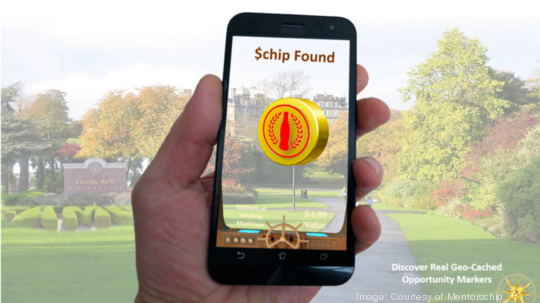
Micah McCrary-Dennis graduated with his Ph.D. in debt, like many college graduates. Now he wants to help future students avoid the same fate.
“I was like, ‘Oh my God, I’m paying for calculus classes I took freshman year,’” McCrary-Dennis said. “That was 16 years ago. That’s absolutely crazy.”
“I started to wonder how many other people are (falling into) those same pitfalls of taking out student loans to cover their education when there were scholarships available to to fulfill that financial cost,” he added.
The scholarship process can be arduous, complicated and difficult to navigate. That’s why McCrary-Dennis has been developing Mentorschip, an augmented reality scholarship scavenger hunt.
The app uses AR and geolocation technology to bring scholarships to students where they are. Virtual opportunity markers are dropped in safe places for students to find, and when they do the app will help them instantly apply.
“The idea came from cognitive studies of game theory, actually,” McCrary-Dennis said. “Play is the highest form of learning.”
McCrary-Dennis designed this program for all students, but has put a particular focus on students of color and first-generation students.
“When there are students coming out of impoverished communities, and underprivileged and underrepresented communities, and they achieved the dream of a college degree, but they’re still saddled with that debt, it does not help them break that generational wealth gap,” McCrary-Dennis said.
The idea was to make a game similar to Pokémon Go to entice students of all ages to engage in the process. But the scholarship aspect is only half of Mentorschip’s foundation.
Scholarships are uploaded by mentors via the app, with the goal being to decentralize the scholarship process. The mentors are then encouraged to check up on the students who received their scholarship, and offer advice and guidance as needed.
“We want to take them out of the privatized reviewers hands, and disseminate and distribute those opportunities amongst the people so that there will be a one-on-one scholarship connection,” McCrary-Dennis said.
Parents will oversee all conversations between mentors and students.
McCrary-Dennis, a former Intel (Nasdaq: INTC) process engineer, started the business in 2017 as a for-profit company. He eventually switched the company to a nonprofit after realizing the for-profit model wasn’t resonating with Mentorschip's audience.
The app still requires a $5 registration fee, but after the first month's payment students can receive membership tokens as part of the scavenger hunt to pay for the program. The $5 payments stay with the student’s account.
The organization is funded through sponsors, which can be corporate and executive level sponsors as well as small businesses. Mentorschip also sees community sponsors donating and participating in placing scholarships.
Right now, Mentorschip is still in its beta phase. The nonprofit spent a lot of the pandemic getting the app ready for a full release and plans to launch on the Google Play Store Sept. 1.



